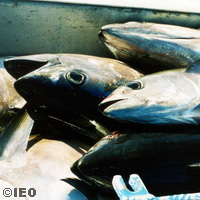Scientists raise red flag on fish sustainability
An international team of scientists has discovered that the effect of fishing for tuna and similar species since the early 1960s has led to a decline in these populations by around 60%. The study, presented in the journal Proceedings of the National Academy of Sciences, was funded in part by the METAOCEANS ('Elucidating the structure and functioning of marine ecosystems through synthesis and comparative results') project, which clinched a Marie Curie Early Stage Research Training (EST) grant worth EUR 2.23 million under the EU's Sixth Framework Programme (FP6). The results have raised red flags, highlighting how several fish species have been overexploited, and particularly how the majority of tuna fish have been exploited to the limits of sustainability. Researchers from Canada, Italy, Spain and the United Kingdom have identified how cold water tuna is the species hardest hit by exploitation, with data showing that their numbers have shrunk by 80%. The Atlantic bluefin and the southern bluefin are part of this group, which is known for being big, long living, and of significant economic value. Another species, the mackerel, has also felt the effect in its numbers. Despite being smaller and having shorter lifespans, mackerel are part of a growing and worrisome trend. The study's findings suggest that fishing knows no boundaries: large or small, all species are at risk. 'The results of this study, which are based on a compilation of more precise estimates, show a global situation of tuna populations that differs from bleaker past interpretations,' explains lead author María José Juan-Jordá of the University of A Coruña in Spain. A past study, published in Nature in 2003, found that the numbers of pelagic fish, including tuna, had shrunk by 90% in the last century. Ms Juan-Jordá, a doctoral student, says that 'there are worrying factors that regional fishing organisations should solve in order to ensure a sustainable future is these fisheries'. The authors of the study note that the management of tuna populations can be a viable solution. But University of Simon Fraser (Canada) researcher Nicholas Dulvy, one of the authors of the study, adds: ' ... with some species, fishing management needs help. The ones with the highest economic value are the most overexploited. There are clearly still people who benefit economically from illegal fishing of bluefin tuna, a case in which international trade goes beyond international fishing regulations, which are usually effective.' Says Ms Juan-Jordá: 'Fishing management organisations must not just use their resources to manage high-value species, such as large tuna, but also for species of lower economic value, which are important as they are a big source of protein for many developing countries.' The findings suggest that boosting hauls could continue to be a risky act, and that any global fishing effort must be followed with a great deal of care as demand continues to grow. 'Therefore, everyone must concentrate now on creating a real future for these populations and the fisheries that depend on them,' comments co-author Iago Mosqueira, a fishing scientist from the Joint Research Centre of the European Commission at Ispra, Italy. Commenting on what needs to done to ensure the species' sustainability, co-author, Professor Juan Freire of A Coruña University, says: 'Serious efforts and effective action are needed to reduce global overfishing, to recover overexploited populations and regulate trade that endangers them. Only then can we guarantee bigger catches, stable financial profits, and reduce our impact on marine ecosystems.'For more information, please visit: Joint Research Centre (JRC): http://ec.europa.eu/dgs/jrc/index.cfm(opens in new window) PNAS: http://www.pnas.org/(opens in new window)
Countries
Canada, Spain, Italy, United Kingdom



